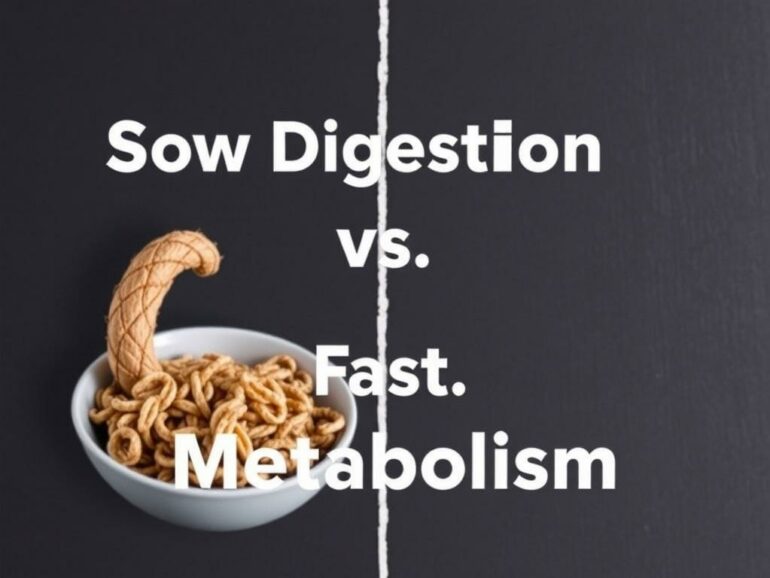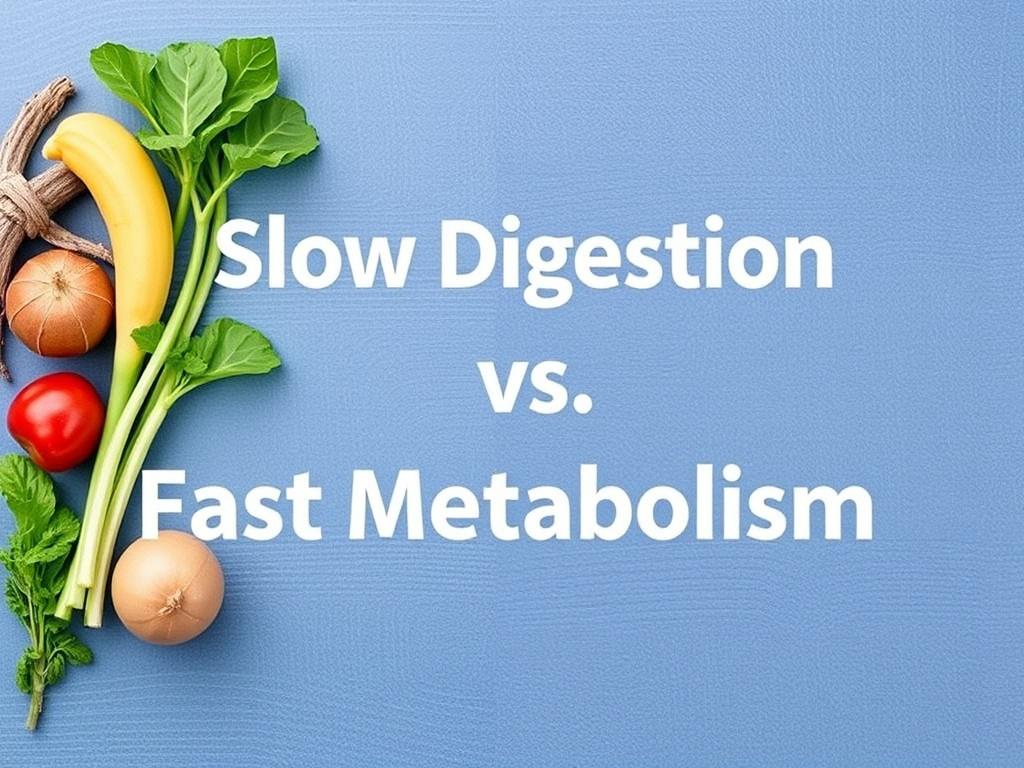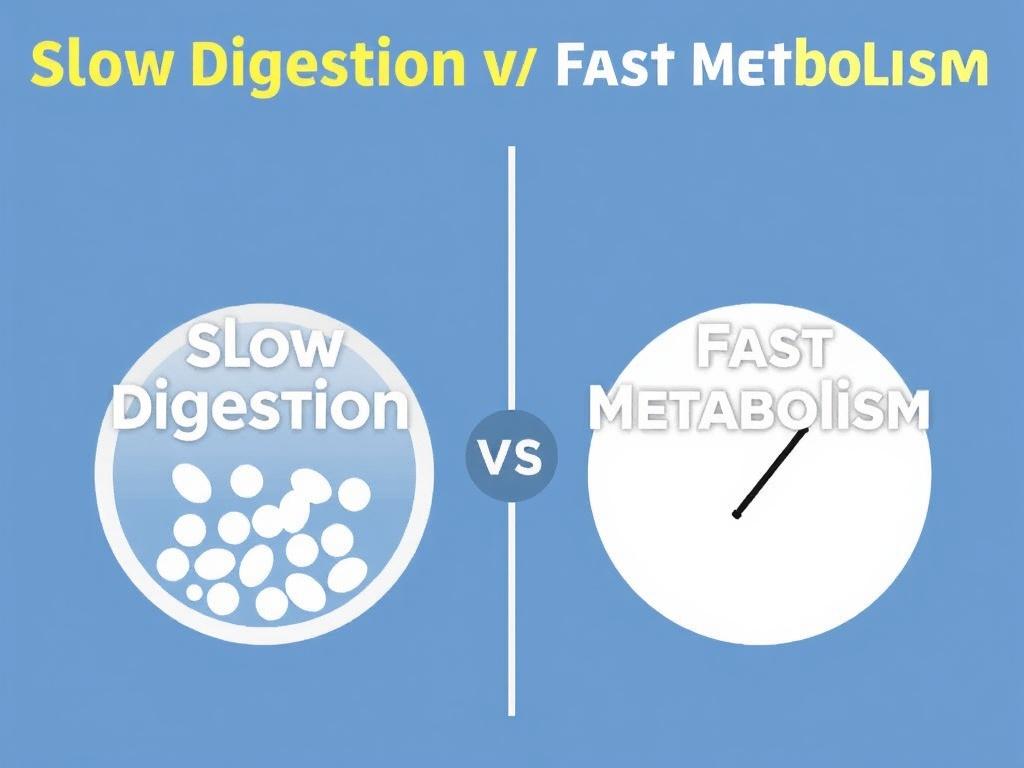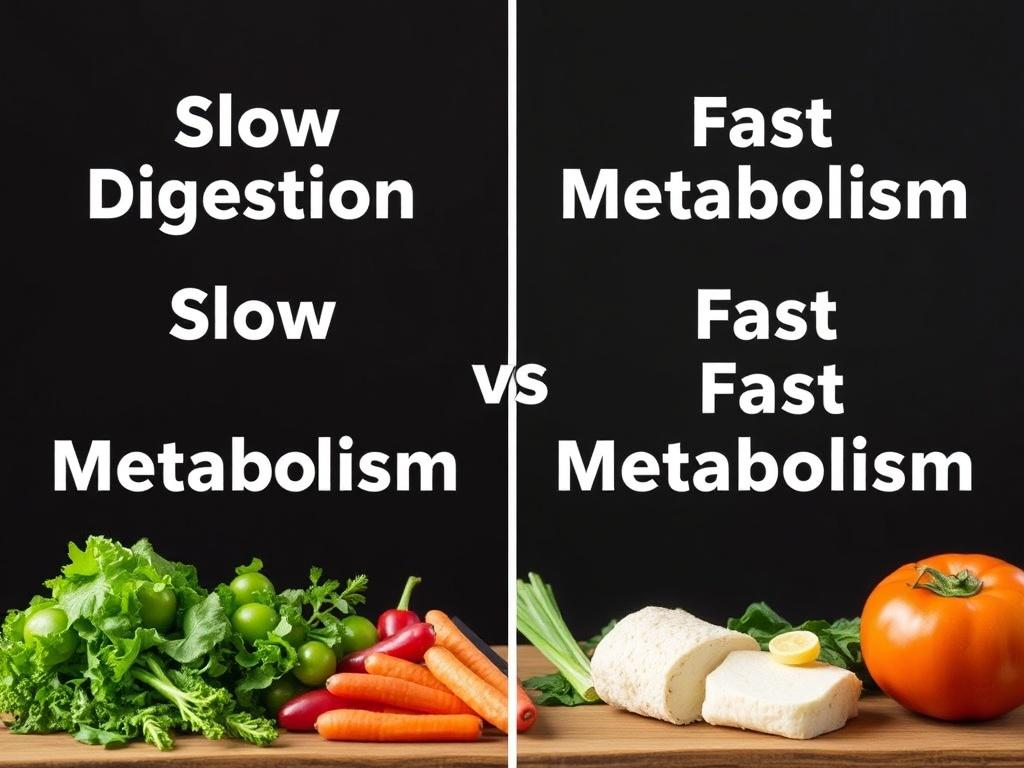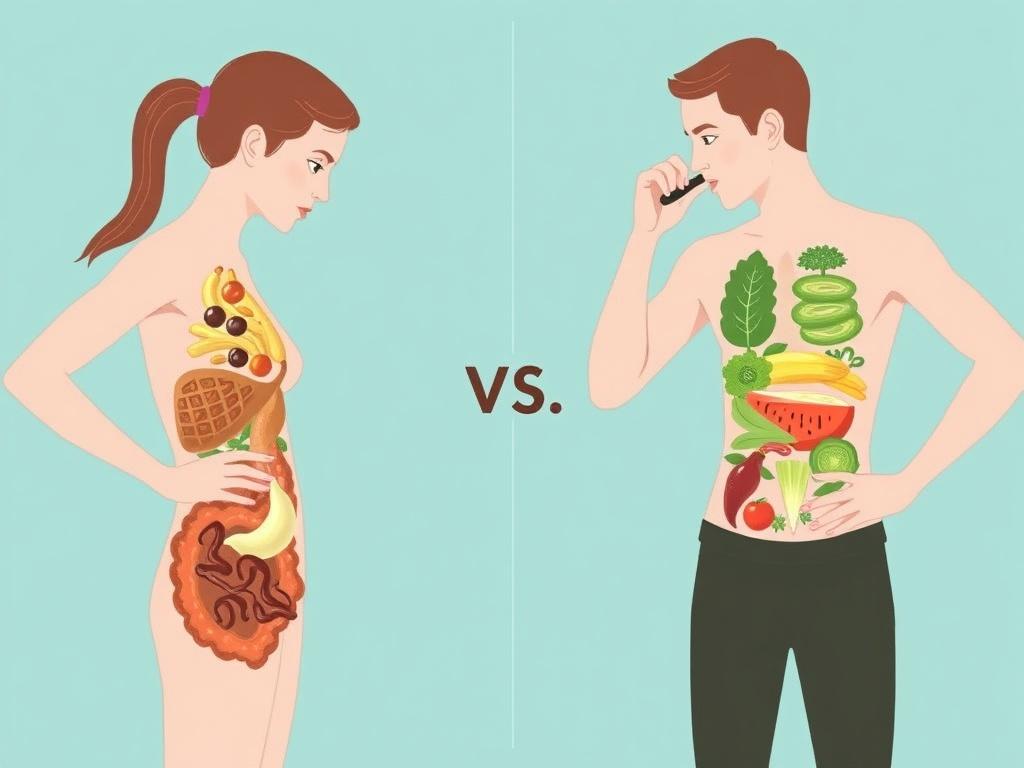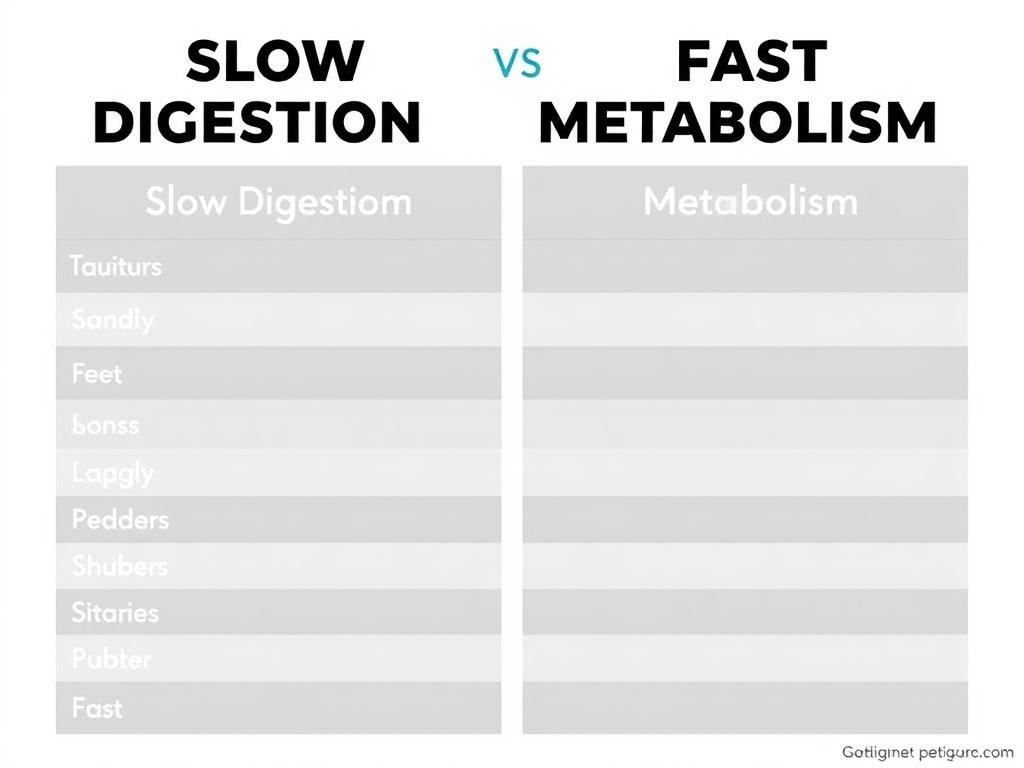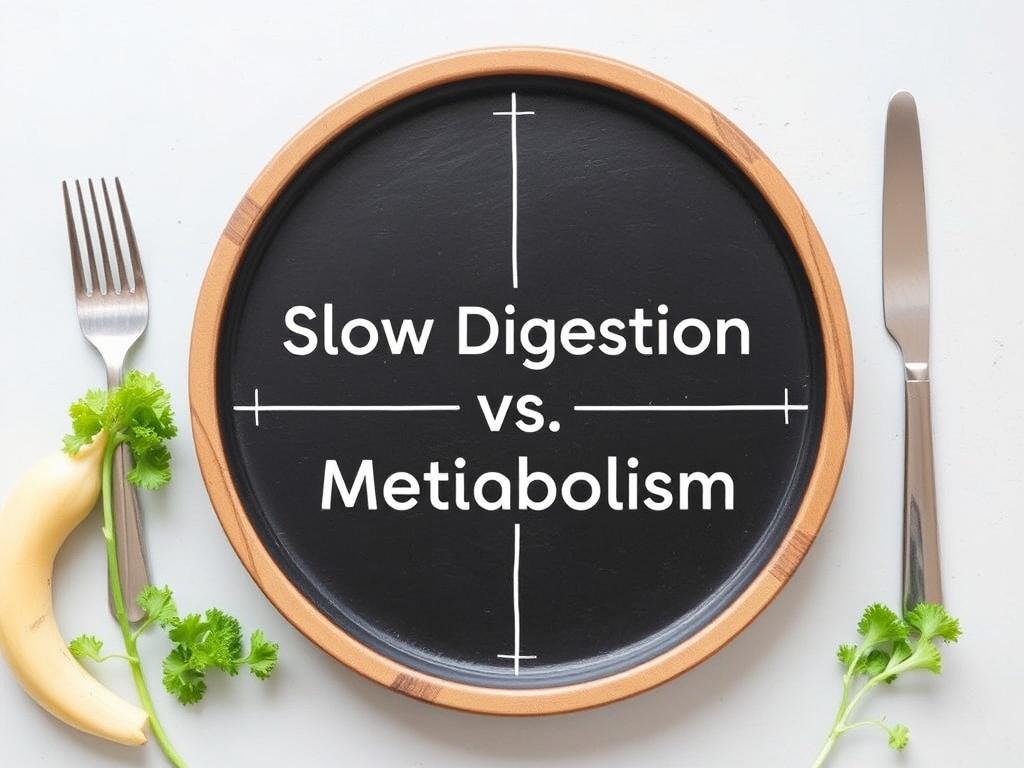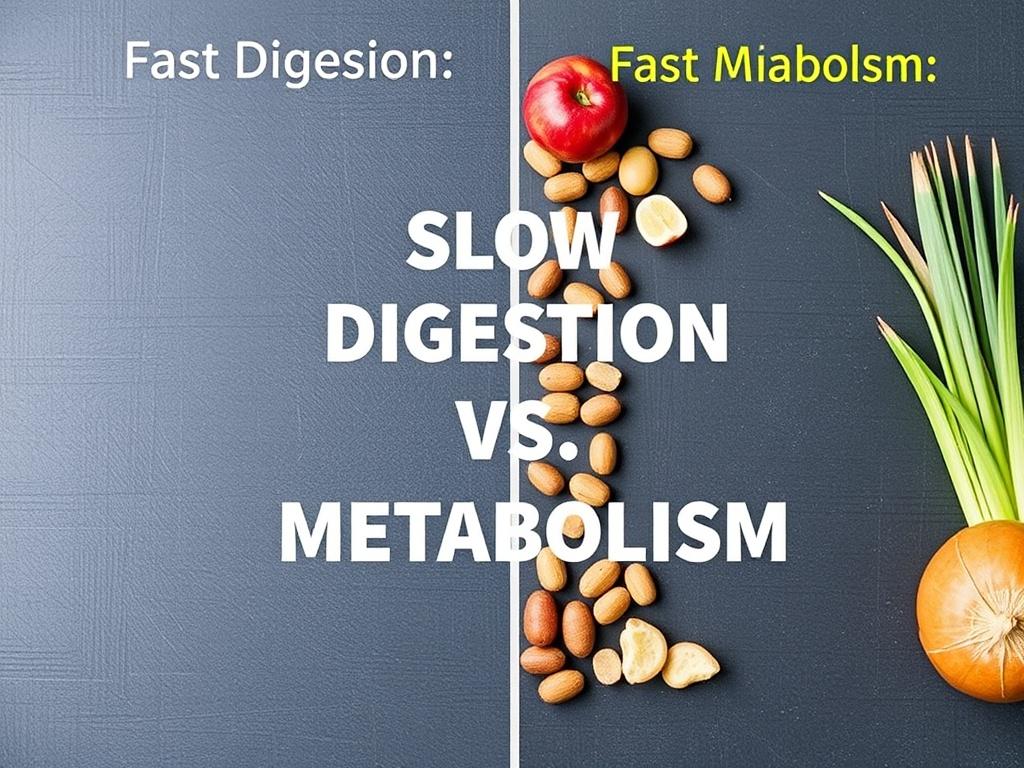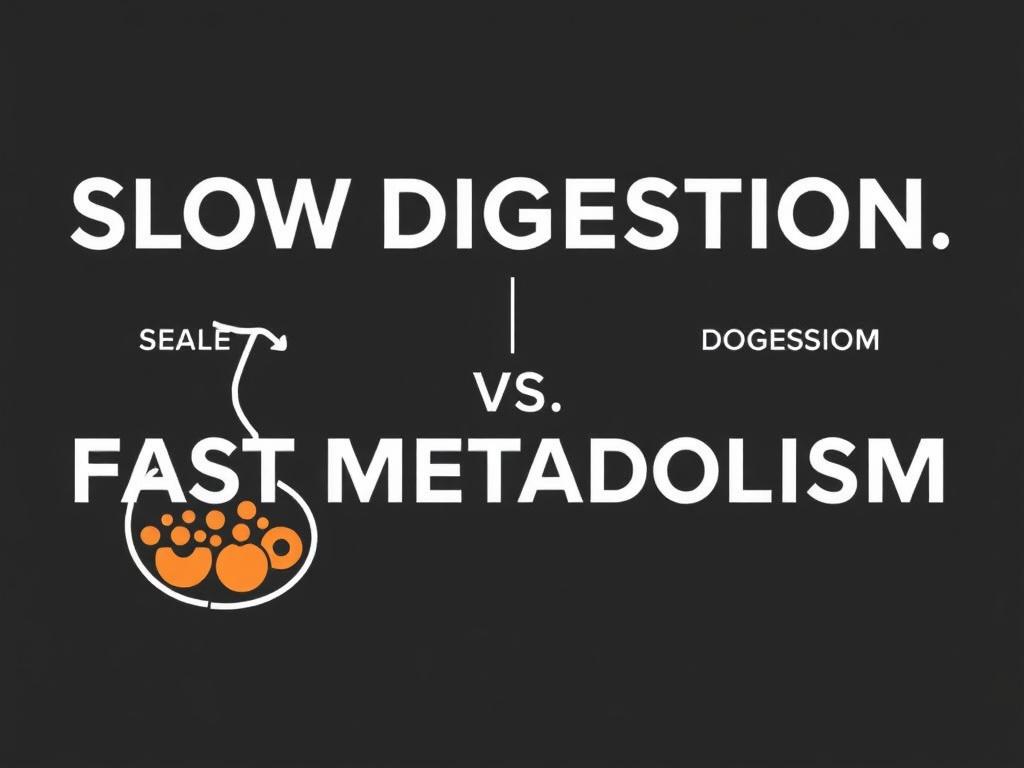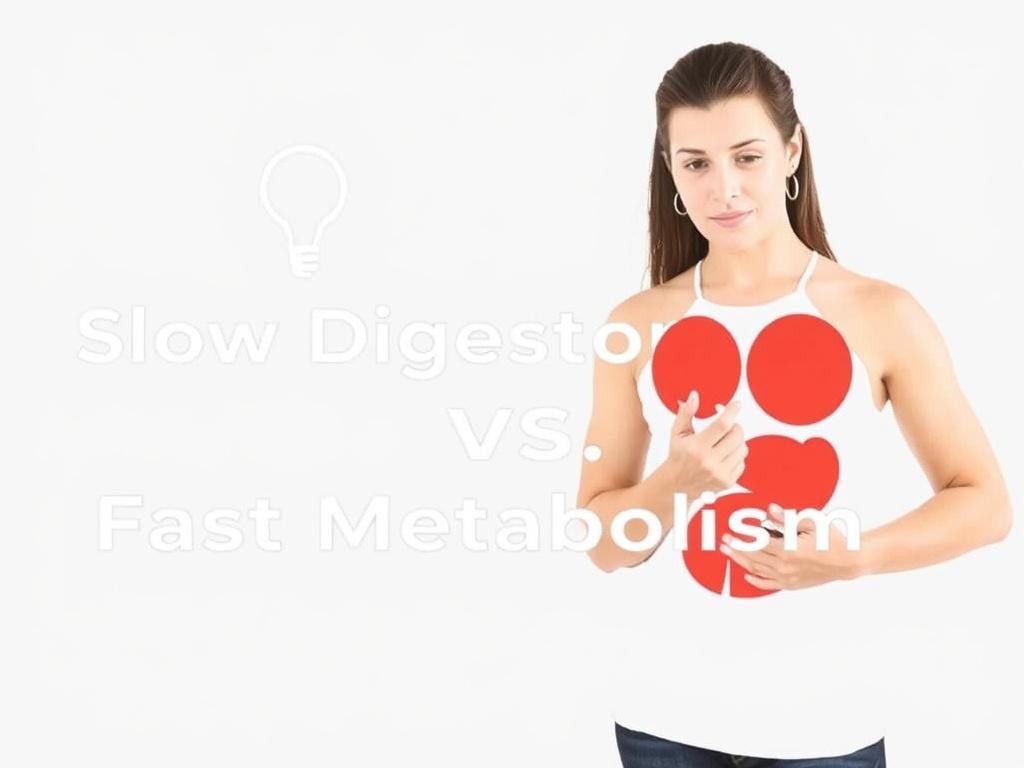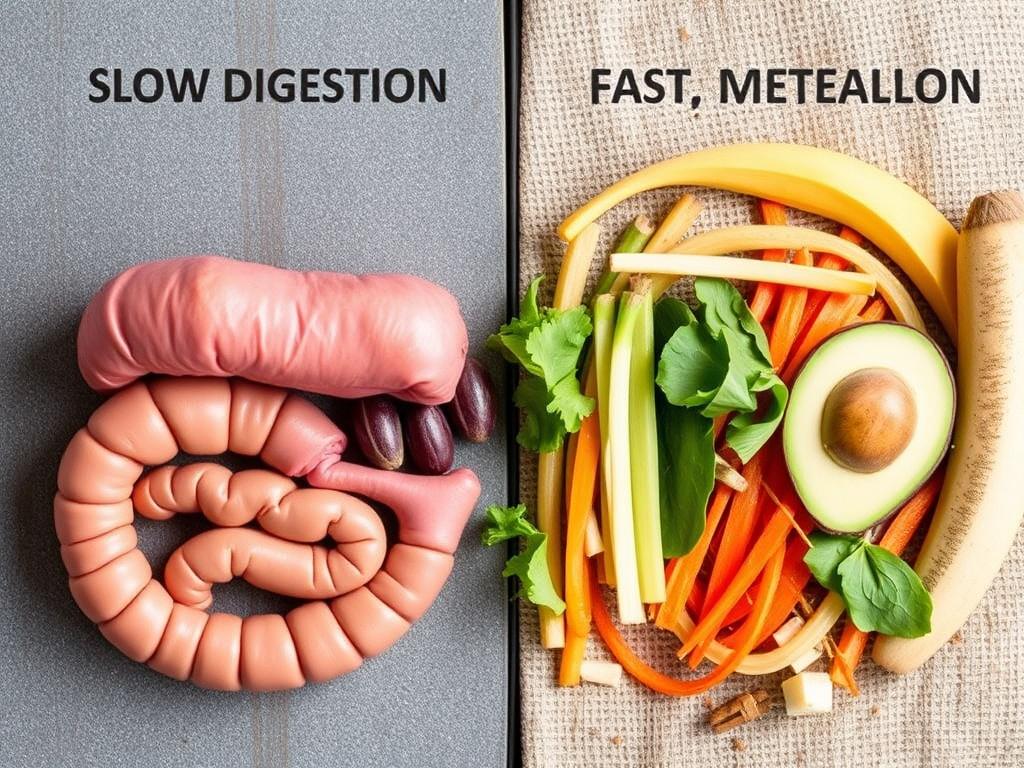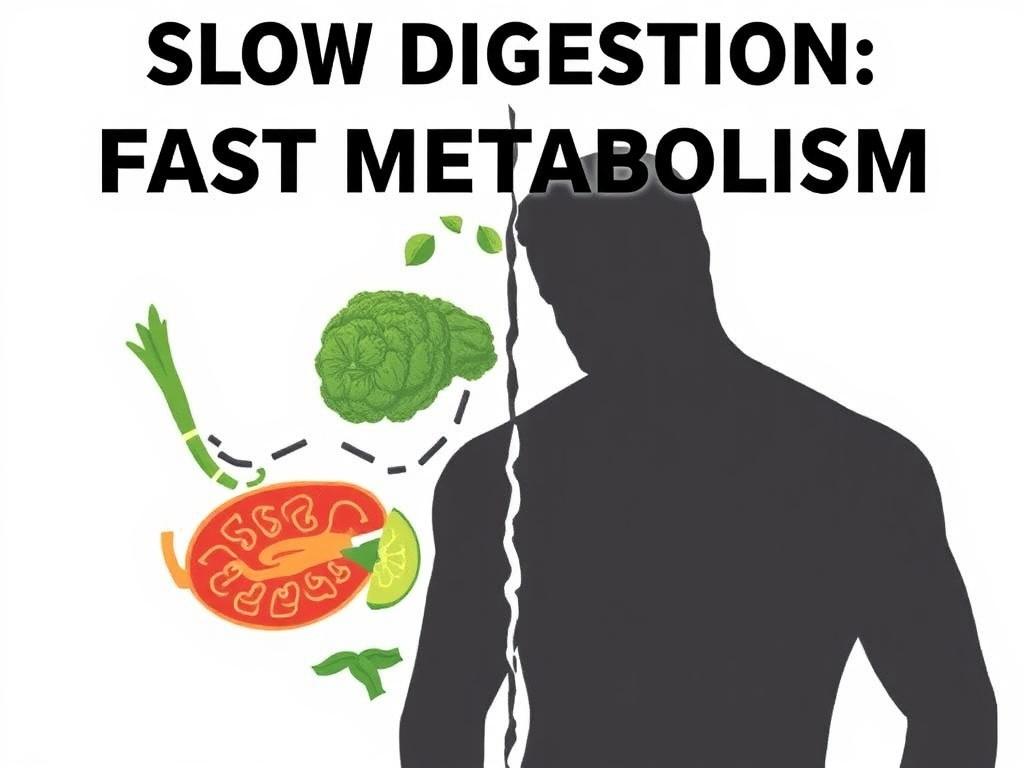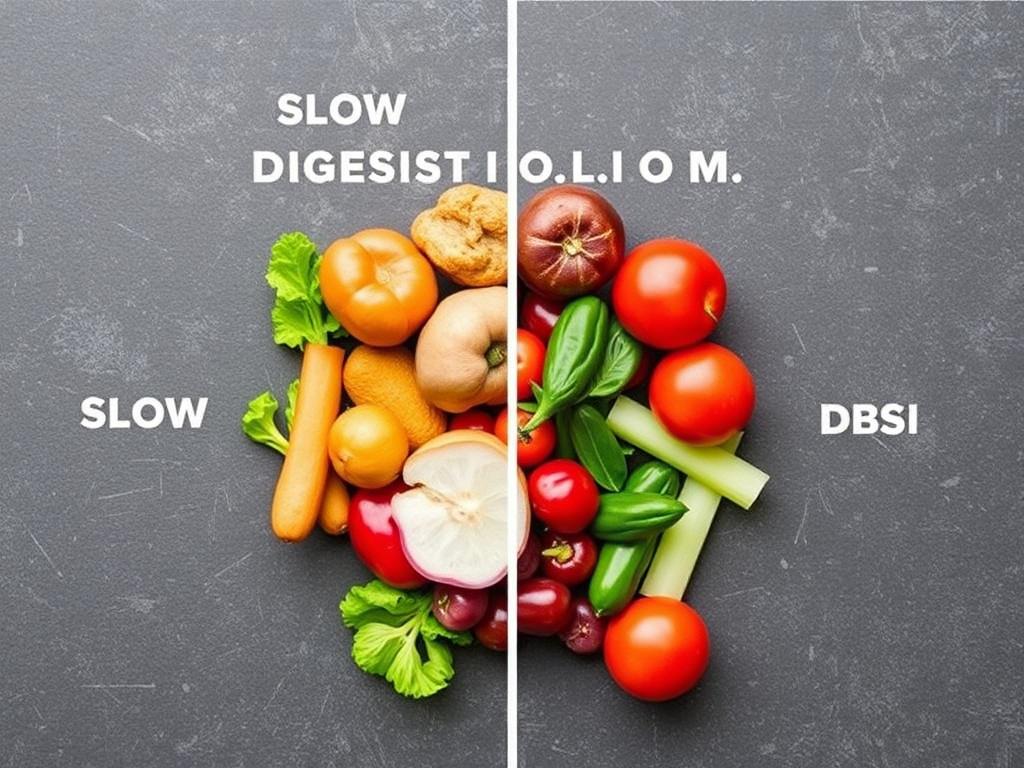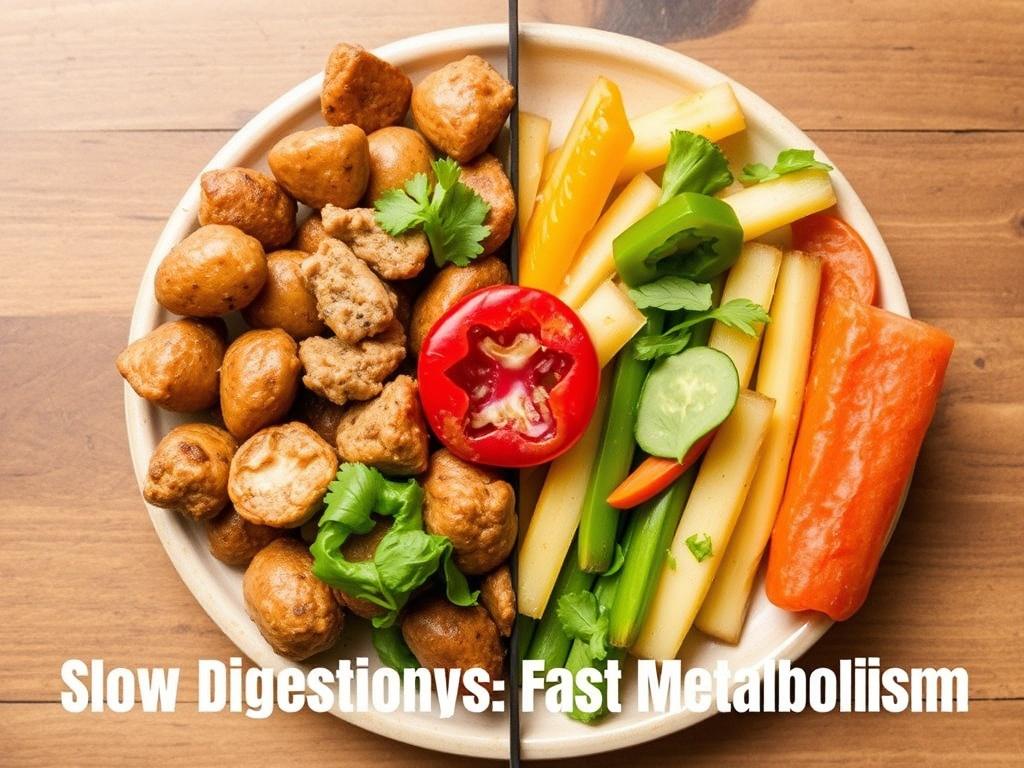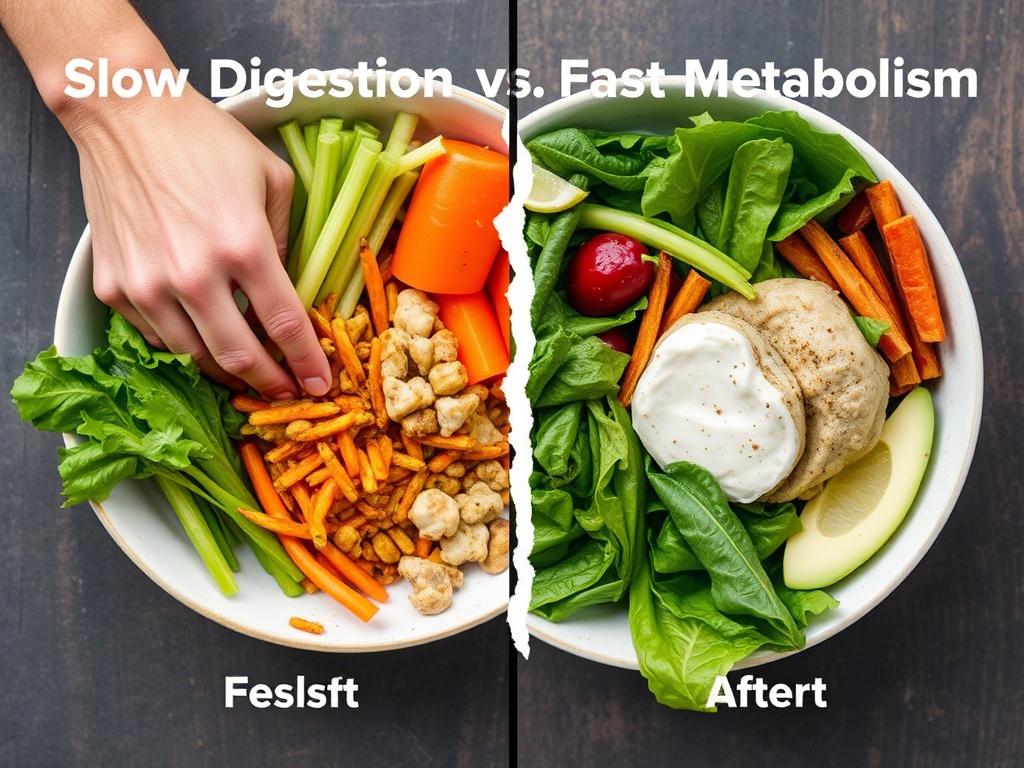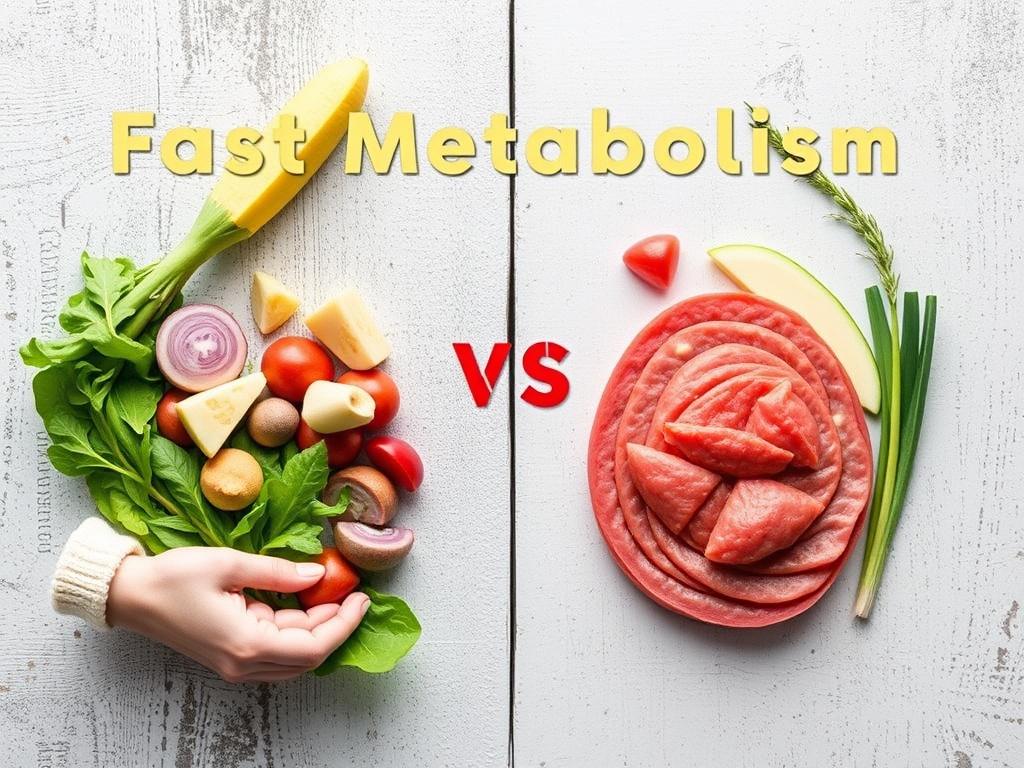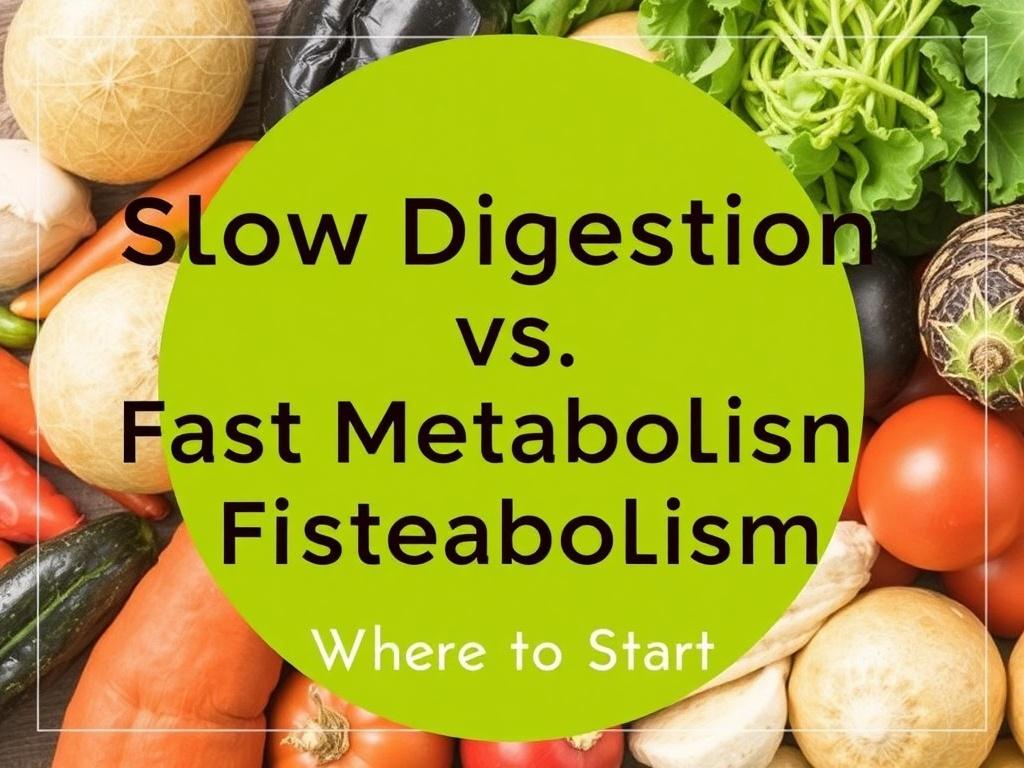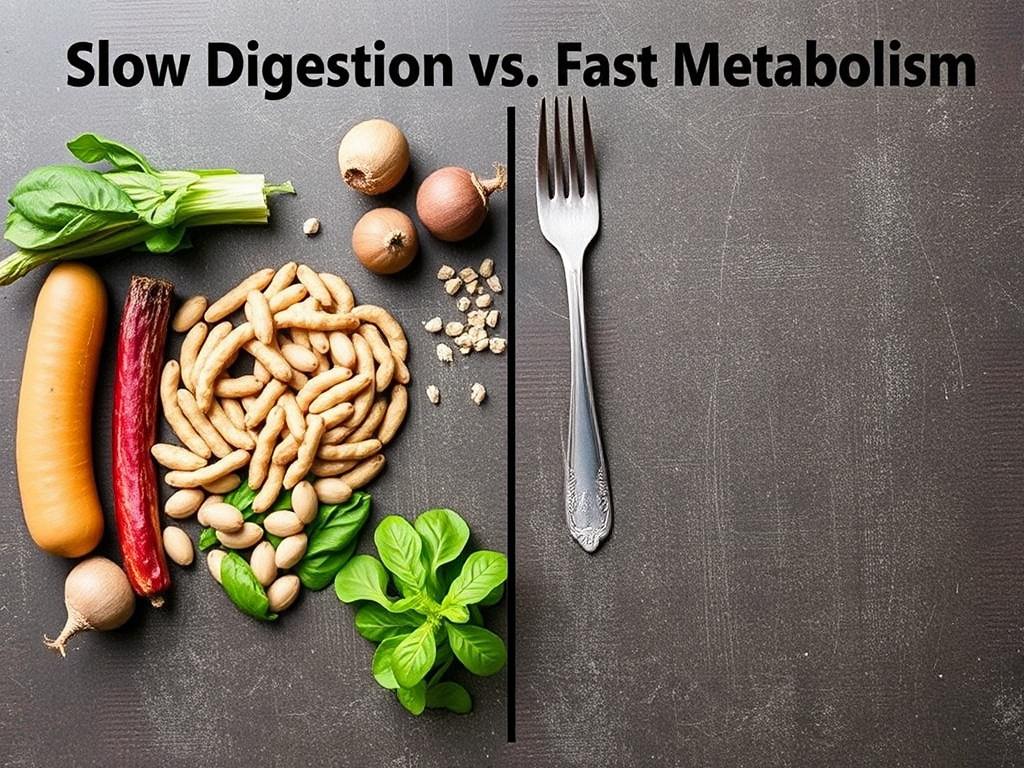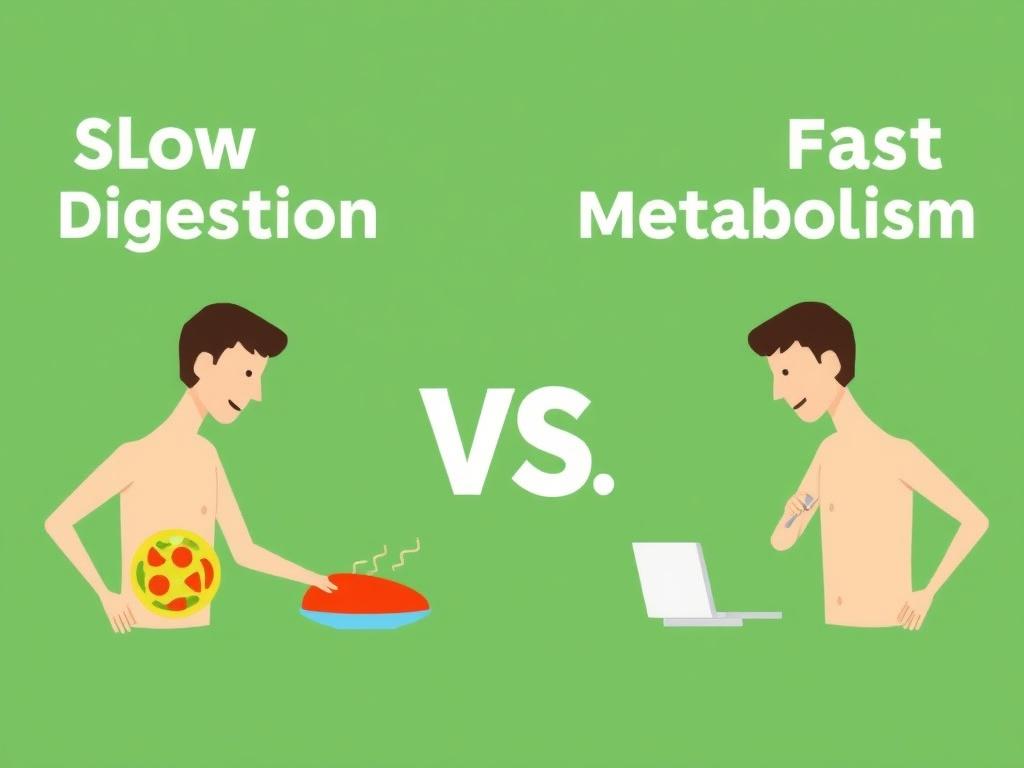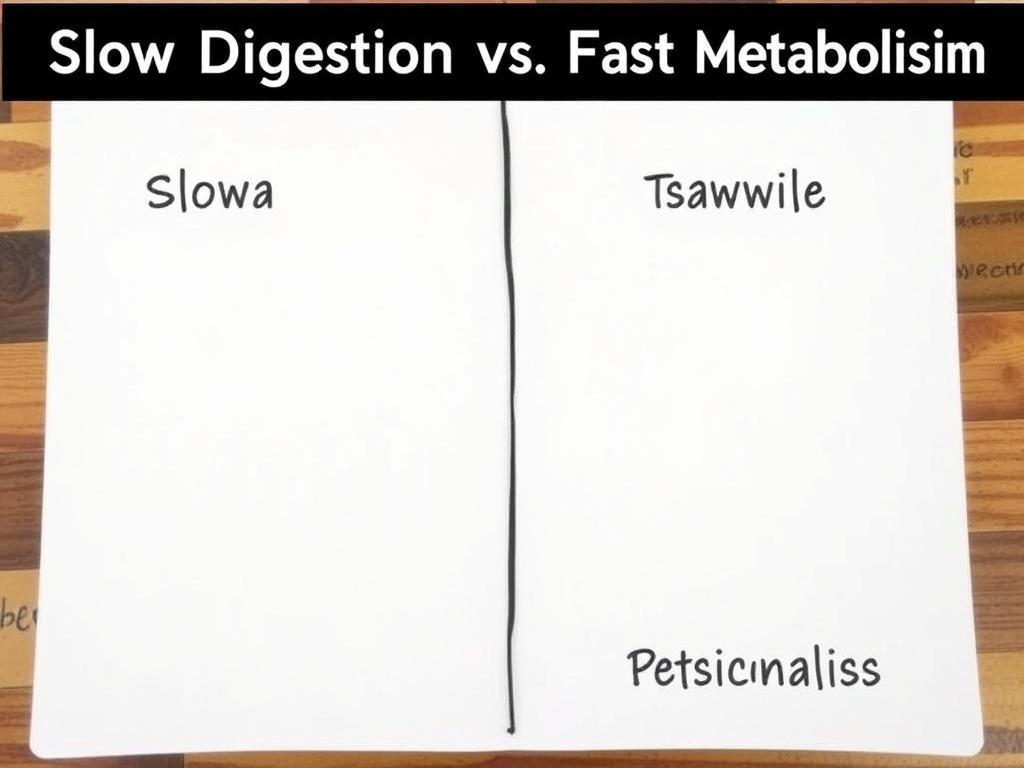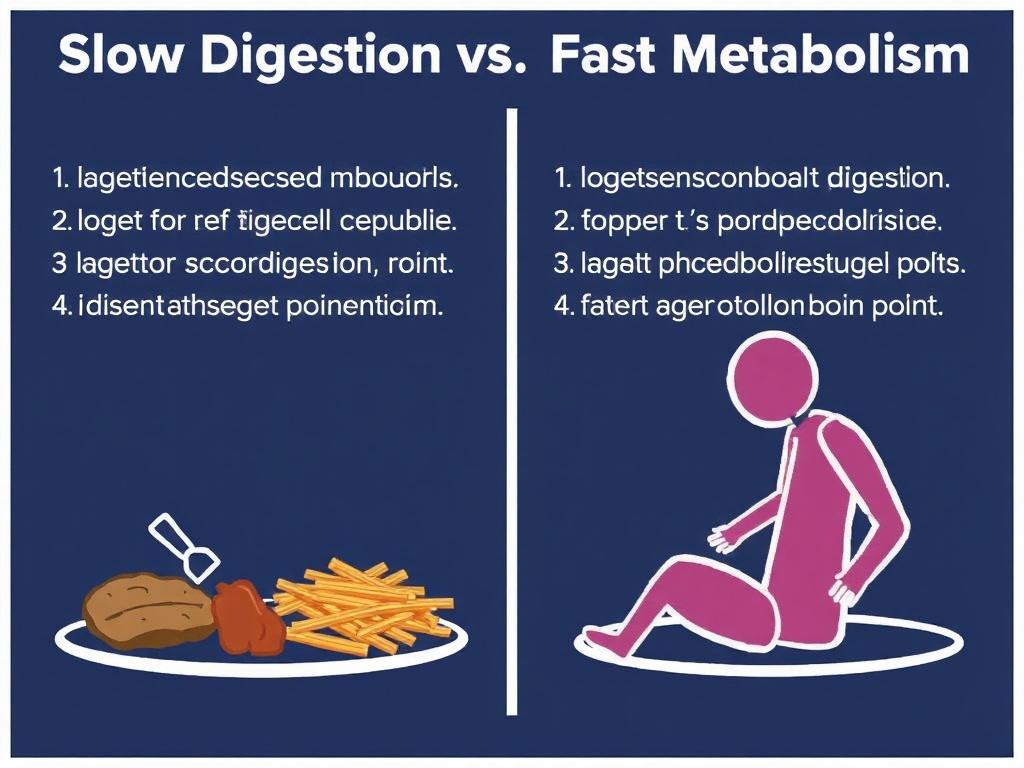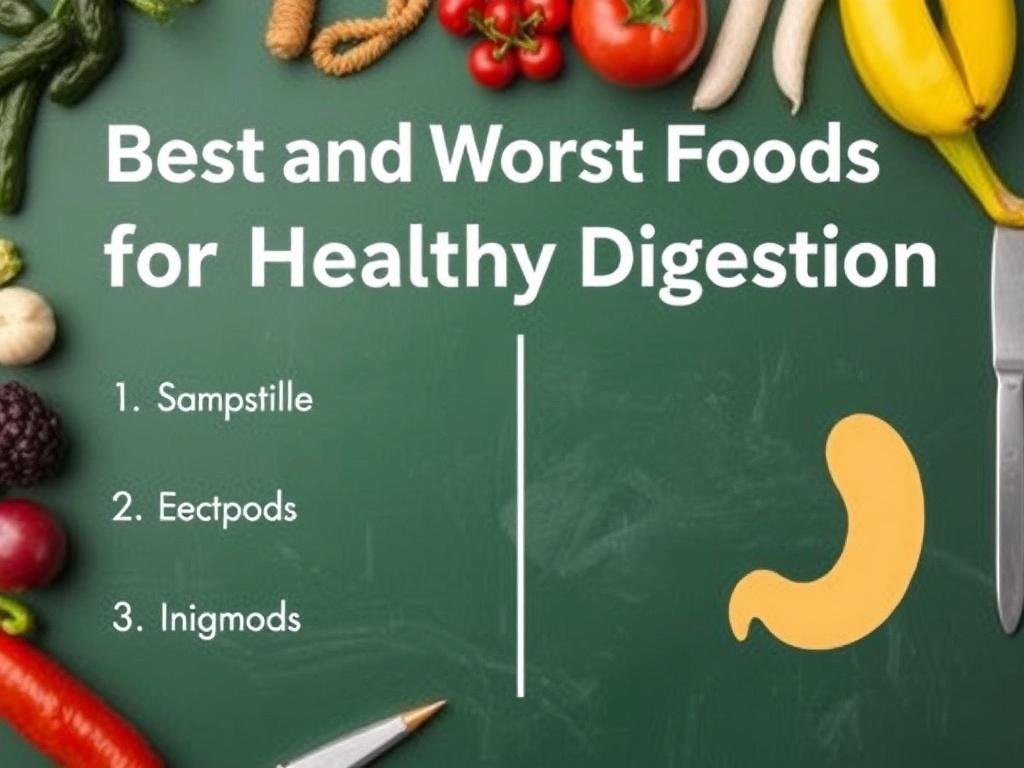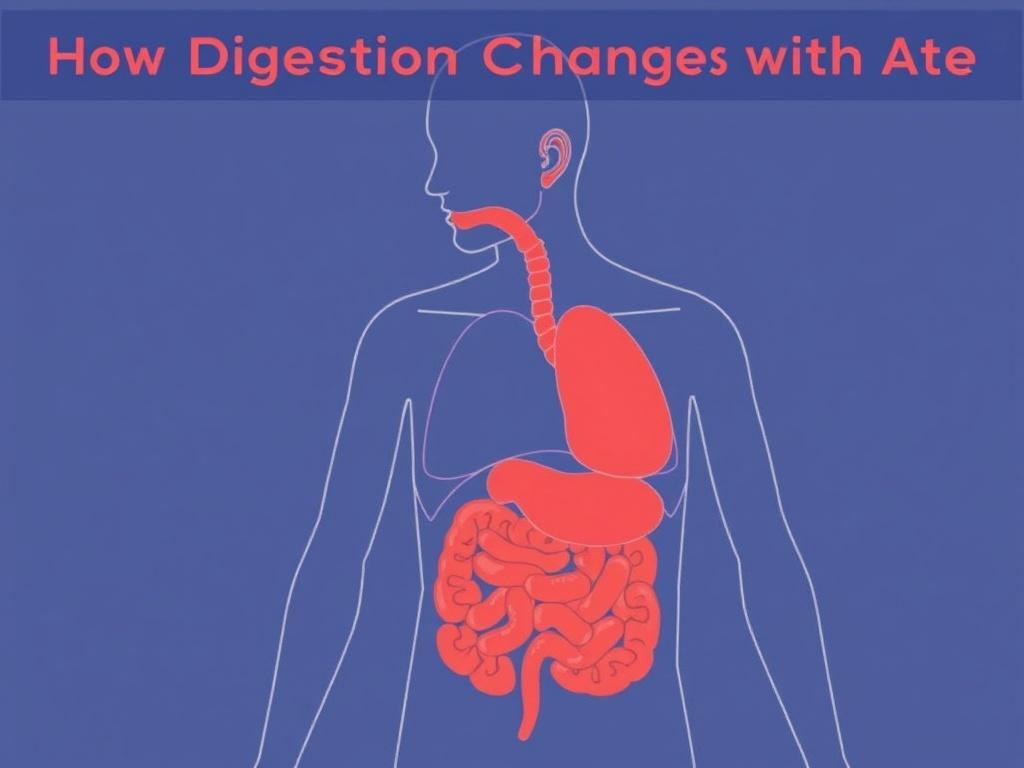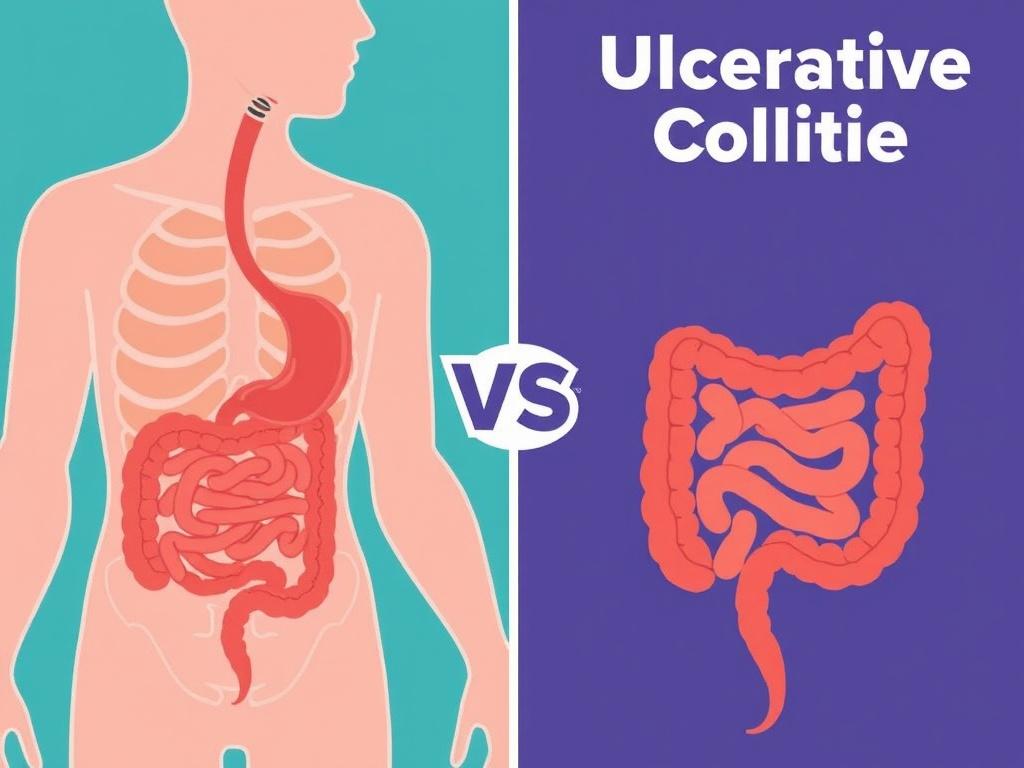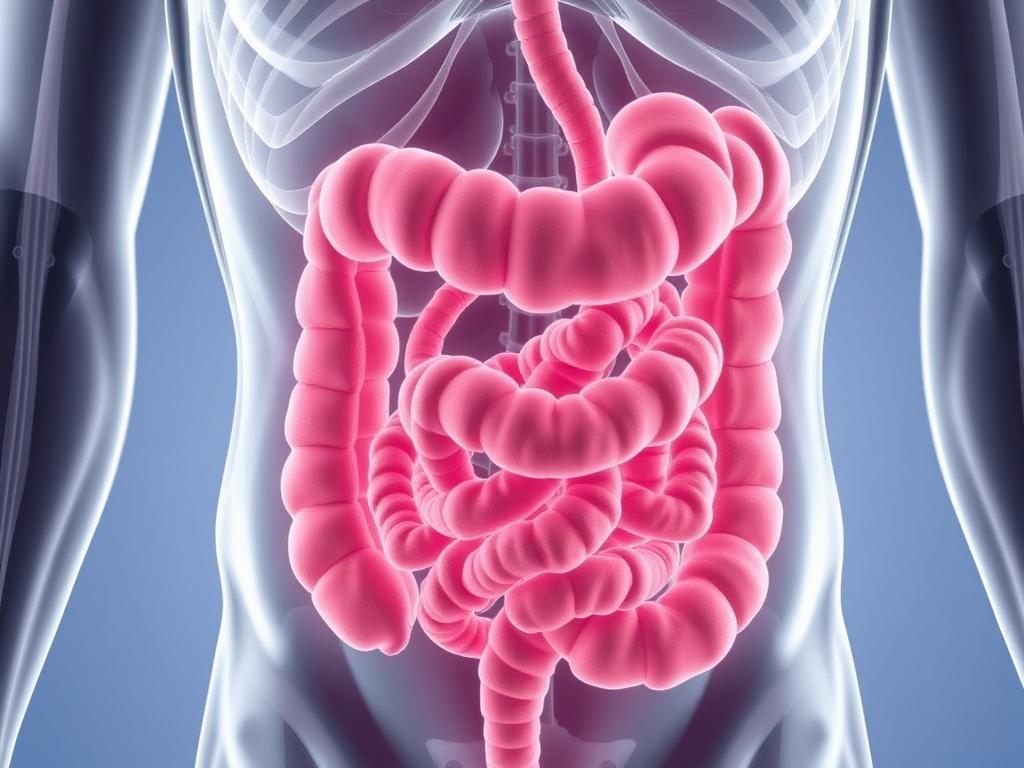People throw around terms like slow digestion and fast metabolism as if they are interchangeable or as if one is always better than the other. But the truth is more interesting and more useful: digestion speed and metabolic rate are two overlapping but distinct parts of how your body handles food, stores energy, and powers activity. In this long, conversational article I’ll walk you through what each term really means, how they interact, why you might care, and practical steps you can take if you want to change something — or simply make peace with how your body works. Expect real-world examples, simple science explained plainly, and actionable tips you can try today.
What Do We Mean by Slow Digestion?
When people say «slow digestion» they usually mean that food moves through the stomach and intestines more slowly than average. That can mean you feel full for longer after a meal, experience bloating or constipation, or notice that stomach discomfort lingers. Slow digestion usually reflects slower gastric emptying (the rate at which the stomach passes food to the small intestine) or reduced intestinal motility (the muscle activity that propels food along the gut). It can be influenced by what you eat, your nervous system, hormones, hydration, and even stress.
Slow digestion is not inherently bad. Slower transit can mean more time for nutrient absorption, more steady blood sugar levels, and longer satiety after meals. On the other hand, if digestion is too slow it can cause discomfort or nutrient malabsorption in some situations. It’s a balance.
Common causes of slow digestion
Slow digestion can arise from many causes, including diet composition, low physical activity, certain medications, hormonal shifts (like hypothyroidism), and gastrointestinal conditions such as gastroparesis. Nervous system input matters too: the parasympathetic system («rest and digest») and sympathetic system («fight or flight») can speed up or slow down gut motility. Aging is another factor — gastrointestinal transit tends to slow with age for many people.
Symptoms that might indicate slow digestion
- Feeling full long after eating or early satiety
- Bloating and gas that persists
- Constipation or less frequent bowel movements
- Occasional nausea or abdominal discomfort
- Unintended weight gain if caloric balance is chronically positive
What Is Fast Metabolism Really?
«Metabolism» often gets used to describe how «fast» someone burns calories. That is a useful shorthand, but metabolism is the set of biochemical processes that convert food into energy and building blocks. When people say «fast metabolism» they typically mean a higher basal metabolic rate (BMR) — the number of calories your body burns at rest to maintain life-supporting functions like breathing, circulation, temperature regulation, and cell repair.
A fast metabolism can mean you burn more calories even without exercising, which may make it easier to maintain or lose weight. But it can also mean increased hunger, more dietary needs, and sometimes a challenge maintaining muscle mass if protein intake and resistance exercise are low.
What determines metabolic rate?
- Lean body mass: Muscle burns more energy at rest than fat, so more muscle generally equals a higher BMR.
- Age: Metabolism tends to slow with age, largely due to loss of muscle mass and hormonal changes.
- Sex: Men typically have higher BMRs due to more muscle mass on average.
- Genetics: Genetic factors influence hormone levels, mitochondrial function, and other factors that affect metabolic rate.
- Hormones: Thyroid hormones, cortisol, and sex hormones play large roles in setting metabolic pace.
- Environment and activity level: Cold exposure and physical activity can raise energy expenditure.
How Slow Digestion and Fast Metabolism Overlap
It helps to think of digestion and metabolism as parts of a pipeline. Digestion breaks food into absorbable components — sugars, fats, amino acids — then the body allocates and burns those molecules via metabolic pathways. They influence each other but they are not the same.
Imagine two people: one with slow digestion and normal metabolism, and another with fast metabolism and normal digestion. The slow digester may feel full longer, have steadier blood sugar after meals, and possibly eat fewer times per day. The fast metabolizer may burn calories quickly, feel hungry sooner, and need to eat more to maintain weight. Someone could have both slow digestion and a fast metabolism — perhaps they absorb nutrients efficiently and then burn them quickly — leading to a specific pattern of hunger and energy.
Examples of how the two interact
- Slow gastric emptying can blunt blood sugar spikes after a meal, which might reduce immediate hunger even in someone with a fast BMR.
- A person with a fast metabolism who eats mostly refined carbs may still experience quick hunger cycles if digestion is rapid for those foods.
- Conversely, a high-fiber diet that slows digestion can provide long-term satiety that helps someone with a high metabolic rate maintain energy balance.
How to Tell Which You Have: Practical Ways to Assess
You don’t need a lab to get an approximate sense of whether your digestion or metabolism is dominating your experience, though professional testing (like gastric emptying studies or indirect calorimetry to measure BMR) can give exact answers.
Signs you might have slow digestion
- Meals leave you feeling overly full for hours.
- You rely on laxatives or enemas to produce bowel movements regularly.
- Bloating and post-meal discomfort are common.
- You have a history of conditions like gastroparesis or hypothyroidism.
Signs you might have a fast metabolism
- You can eat a lot of food without gaining weight easily.
- You often feel hungry and need frequent snacks.
- Resting energy and daily activity leave you burning through calories quickly.
- You struggle to gain weight or muscle despite adequate eating and training (though this can also reflect poor nutrition strategy).
Simple self-tests
- Track fullness and hunger: Keep a food and hunger journal for two weeks. Note how long you stay full after meals and how often you truly feel hungry.
- Track bowel habits: Frequency, consistency (use the Bristol Stool Chart if you want a visual), and timing can give a picture of transit time.
- Calorie response: If you eat the same amount of calories for two weeks and your weight changes dramatically, metabolic rate might be a major factor.
Table: Quick Comparison — Slow Digestion vs. Fast Metabolism
| Feature | Slow Digestion | Fast Metabolism |
|---|---|---|
| Primary meaning | Food moves slowly through stomach/intestines | Higher rate of energy (calorie) expenditure at rest |
| Common signs | Bloating, fullness, constipation | High appetite, fast calorie burn, difficulty gaining weight |
| Typical causes | Low fiber, low activity, certain meds, hormonal imbalances | High muscle mass, thyroid drive, genetics, cold exposure |
| Impact on blood sugar | May blunt spikes due to slower absorption | Variable — depends on food and insulin sensitivity |
| When it helps | Longer satiety, stable glucose for some people | Easier weight maintenance when active, better tolerance of higher calorie diets |
| When it causes problems | Discomfort, nutrient issues in severe cases | Excess hunger, difficulty gaining muscle or weight |
Diet Strategies That Influence Digestion and Metabolism
You can shape both digestion speed and metabolic rate through diet, although some factors (genetics, age) are less controllable. The good news is that many simple choices reliably shift things in predictable ways.
How to manage slow digestion with food
- Increase fiber gradually. Soluble fiber (oats, apples, beans) can increase satiety and slow gastric emptying; insoluble fiber (whole grains, nuts, vegetables) supports bowel regularity when paired with adequate water.
- Stay hydrated. Water helps stool move and supports enzymatic digestion.
- Mind portion size and meal pacing. Smaller, more frequent meals can reduce post-meal discomfort for some slow digesters.
- Include fermented foods. Yogurt, kefir, sauerkraut, kombucha may support a healthy microbiome, which influences motility.
- Limit heavy, high-fat meals if fat consistently triggers fullness and nausea — fats slow gastric emptying.
How to support a healthy metabolic rate with food
- Prioritize protein. Protein has a higher thermic effect of food (TEF) and supports muscle maintenance and growth.
- Balance carbohydrates: choose whole-food carbs that sustain energy without sharp insulin spikes if you’re managing hunger.
- Aim for adequate total calories. A chronically low-calorie diet can force down BMR as your body adapts.
- Distribute meals based on activity. Eating more around your training sessions can support performance and recovery.
Lifestyle Changes That Shift Digestion and Metabolic Rate
Food matters, but movement, sleep, stress, and routine are equally powerful.
Exercise: the lever that moves both systems
Resistance training builds and preserves muscle mass, raising resting metabolic rate over time. Aerobic and interval training increase daily energy expenditure and can influence mitochondrial efficiency. For digestion, regular movement stimulates gut motility — a 10- to 30-minute walk after a meal can help with bloating and transit.
Sleep and stress
Poor sleep impairs hormonal balance (ghrelin and leptin), often increasing hunger and reducing metabolic efficiency. Chronic stress raises cortisol which can slow digestion for some and raise appetite for others. Prioritizing sleep hygiene and stress management (breathing exercises, time outdoors, social connection) helps both digestion and metabolism.
Routine and timing
Eating on a regular schedule can entrain circadian rhythms related to digestion and metabolism. Some people find time-restricted eating helpful to reduce late-night eating and stabilize hunger; others find it worsens digestion by compressing large meals into short windows. Experimentation with consistent routine is key.
Common Myths and Misconceptions
There are cultural beliefs about digestion and metabolism that are persistent but misleading. Let’s clear up a few.
Myth: Spicy food permanently speeds up metabolism
Spicy foods like chili peppers can temporarily raise metabolic rate slightly due to capsaicin’s effect, but the effect is short-lived and not a weight-loss solution by itself.
Myth: If you have slow digestion you have a slow metabolism
Not necessarily. Someone can have slow gastric emptying and a high BMR. They may feel full longer but still need more calories overall. The reverse is also true.
Myth: Eating late at night makes you gain weight because digestion is worse at night
Late eating becomes a problem mainly when it increases total daily calories or when it disrupts sleep. Individual responses vary with chronotype and lifestyle.
Myth: Metabolism is fixed and can’t be changed
Metabolic rate has a genetic component, but you can influence it through changing lean mass, activity level, and sometimes environmental factors like consistent cold exposure and diet composition. Age-related decline can be mitigated substantially with resistance training and protein intake.
When to See a Professional
Some issues that feel like «slow digestion» or «fast metabolism» warrant medical attention. If you experience severe, persistent, or worsening symptoms, see a healthcare provider.
- Unexplained weight loss or very rapid weight gain
- Persistent vomiting, severe abdominal pain, bleeding, or dehydration
- Signs of nutrient deficiencies (hair loss, brittle nails, fatigue that doesn’t respond to rest)
- Blood sugar extremes or fainting
A clinician can order tests such as thyroid function panels, glucose monitoring, gastric emptying studies, or refer you to a gastroenterologist or endocrinologist as appropriate. Dietitians can help structure meals to manage symptoms and meet goals.
Practical Daily Habits to Balance Digestion and Metabolism
These are small, simple moves you can try; they often add up to big changes.
Morning routine
- Hydrate first thing — a glass of water can help kickstart digestion and hydration status.
- Include a protein-rich breakfast if you have a high metabolic demand; it supports satiety and muscle maintenance.
- Move: a short walk or gentle mobility work primes both metabolism and gut motility.
Meal-time habits
- Eat slowly and chew thoroughly — this aids digestion from the start, reducing bloating and improving nutrient breakdown.
- Include fiber and protein in each meal to balance digestion speed and satiety.
- Consider post-meal movement: walking stimulates digestion and uses calories without being hard on the body.
Evening habits
- Avoid massive late-night meals if you struggle with reflux or bloating; smaller dinners often ease digestion.
- Prioritize sleep: aim for consistent bedtimes and a dark, cool room to support hormonal balance.
- If you have constipation, gentle evening stretching or yoga can stimulate bowel activity.
Supplement and Food Notes
There are many supplements marketed to «speed up metabolism» or «fix slow digestion.» Some have evidence, others are hype.
Supplements with some evidence
- Probiotics: may improve gut health and certain types of digestion issues, though strains matter.
- Fiber supplements: can help if dietary fiber is low, but increase slowly to avoid gas.
- Protein supplements: convenient for meeting protein goals and supporting muscle mass.
Use caution with stimulants
Caffeine can temporarily increase metabolic rate and stimulate bowel movements, but reliance can lead to tolerance and sleep disruption, which ultimately harms both digestion and metabolism.
Special Populations: Tailoring Advice
What works for one person may not work for another. Here are some examples.
Older adults
Older adults often face slower digestion and declining muscle mass. Focus on fiber, hydration, and resistance training to support transit and metabolic rate while being mindful of dental or swallowing issues.
Athletes
Athletes may have high metabolic rates and need careful meal timing and composition to fuel training and recovery. Digestion speed matters for pre-workout meals: choose easily digested carbs and moderate protein before intense sessions.
People with diabetes
Digestion speed affects blood sugar. Slower gastric emptying (gastroparesis) can make blood sugar management tricky. Working with an endocrinologist and dietitian is important to coordinate medication timing and food choices.
Real-Life Stories: How People Navigate the Differences
Stories help make abstract ideas real. Consider three brief profiles:
Anna: The slow digester who learned to thrive
Anna frequently felt bloated and full after meals. She avoided dinners out because she feared discomfort. By gradually increasing soluble fiber, walking after meals, and reducing high-fat restaurant dishes, her bloating diminished and she regained confidence enjoying social meals.
Marcus: The fast metabolizer who wanted to gain muscle
Marcus burned calories quickly and couldn’t gain weight. He added structured resistance training, consumed more protein and calorie-dense whole foods (nuts, avocados, smoothies), and started eating an extra snack each day. Over months he gained muscle and felt more energetic.
Rina: The mixed case who balanced both
Rina had a busy job, irregular meals, and both occasional constipation and sudden hunger. She created a simple routine: a protein-rich breakfast, a mid-morning walk, regular meals, and a bedtime routine for sleep. She consulted a dietitian to optimize fiber and protein, which reduced symptoms and stabilized weight.
Measuring Progress and Adjusting Approach
Change takes time and good tracking. Use simple measures to see what’s working.
- Weight and body composition: track gently and infrequently; use body measurements or how clothes fit to complement scale data.
- Symptom logs: note changes in fullness, bloating, bowel frequency, and energy.
- Performance markers: for those exercising, track strength, endurance, and recovery.
- Quality of life: improved sleep, reduced anxiety around meals, and fewer disruptions are meaningful outcomes.
Be patient: habits that alter muscle mass or hormonal patterns can take months to show full effects.
When Lifestyle Isn’t Enough: Medical and Therapeutic Options
For some people with diagnosed conditions (e.g., gastroparesis, severe hypothyroidism, or endocrine disorders), lifestyle changes must be combined with medical treatment. Medications, device therapies, or surgical options may be considered depending on the diagnosis. Always consult a clinician before starting medications or making substantial changes based on a health condition.
Common medical interventions
- Prokinetic agents for certain slow gastric emptying conditions.
- Thyroid hormone replacement for hypothyroidism.
- Nutritional support for severe malabsorption or weight loss (e.g., enteral nutrition when needed).
- Referral to specialists (gastroenterology, endocrinology, or nutrition).
Final Practical Checklist: Where to Start
- Keep a simple two-week diary of meals, hunger, bowel patterns, and energy. This reveals patterns.
- Boost protein and fiber gradually while prioritizing hydration.
- Add resistance training twice a week to build lean mass and support metabolism.
- Include daily movement, especially after meals, to help digestion.
- Prioritize sleep and stress reduction; they influence hormones central to both systems.
- Consult a healthcare provider if you have severe symptoms or unexplained weight changes.
Resources and Tools You Can Use
If you want to learn more or track things more precisely, consider these tools: a food and symptom journal app, a basic fitness tracker for daily steps and activity, a body composition scale (used cautiously), and reputable online resources like clinical nutrition guides and gastroenterology clinic pages. A registered dietitian can personalize strategies to your needs.
Common Questions People Ask
Can you speed up slow digestion naturally?
Yes — often with fiber adjustments, hydration, movement, and reviewing medications that may slow gut motility. If lifestyle adjustments fail, a medical workup is warranted.
Does fast metabolism mean I can eat anything?
Not necessarily. Fast metabolism may let you maintain weight more easily, but diet quality still affects health, performance, and long-term risk factors like cholesterol and blood sugar control.
Is one better than the other?
Neither «slow digestion» nor «fast metabolism» is inherently better. The ideal state is comfortable digestion with a metabolic rate that supports your goals — whether that’s endurance training, weight maintenance, or just feeling energetic. The goal is functional: your body should support your life, not frustrate it.
Thoughts on Personalization and Patience
Our bodies are complex systems shaped by genetics, life experience, and daily choices. Quick fixes rarely solve fundamental mismatches between diet, activity, and biological rhythms. The most sustainable improvements come from small, consistent changes: a daily walk, a gradual shift in meal composition, or a resistance training routine built up over months. Personalization matters — what works for a marathon runner won’t be right for a parent juggling shift work. Experiment with kindness and curiosity, and treat your body as an ally you are curious to understand.
Conclusion
Slow digestion and fast metabolism are distinct but related parts of how your body handles food and energy. Understanding the difference lets you choose strategies that fit your goals — whether that’s alleviating bloating, gaining muscle, or stabilizing energy. Small, consistent lifestyle changes — better sleep, thoughtful nutrition, regular movement, and stress management — often improve both digestion and metabolic health. When symptoms are severe or unexplained, seek professional evaluation to rule out medical conditions. Above all, be patient with change, track what matters, and tailor the approach to your life so your body supports the activities and experiences you care about.
Читайте далее: